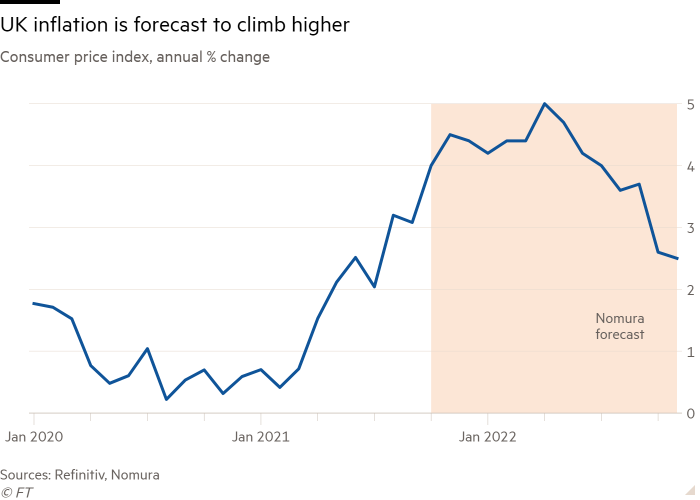Will UK inflation hit the highest level in a decade?
UK inflation is forecast to hit its highest rate in a decade in October as supply chain disruptions, rising energy prices and a tight labour market push the cost of consumer goods sharply higher.
Consumer price growth will reach an annual pace of 3.9 per cent in October, a pick-up from the 3.1 per cent registered in September, according to a Refinitiv survey of economists. George Buckley, economist at Nomura, said ahead of a report from the Office for National Statistics on Wednesday that he expects inflation will climb further to 4.5 per cent in November and to reach a peak of 5 per cent in the spring of next year, in line with Bank of England expectations.
After the spring, the BoE expects inflation to fall as the impact of higher oil and gas prices fades, the demand for goods cools and some of the raw material shortages ease.
However, BoE governor Andrew Bailey said that the “crucial” element to judge to what extent inflation would be temporary, and thus the scale and the pace of the bank’s response, was the evolution of the labour market following the end of the furlough scheme in September. Valentina Romei

Will US retail sales accelerate into the holiday season?
US retail sales are expected to have grown at a swifter pace in October than the previous month, as the industry prepares for what is expected to be a strong holiday season while navigating supply chain bottlenecks and worker shortages.
Many Americans are getting their Christmas shopping done early this year in hopes of avoiding out-of-stock warnings closer to the holiday. Coupled with robust demand for Halloween items, the early holiday rush has probably given sales an autumn boost.
Sales are on track to increase 1.4 per cent from the previous month, which would mark a rise from the 0.7 per cent September rise, according to a Refinitiv poll of economists ahead of the release of the monthly figures on Tuesday.
The retail industry is scrambling to meet resurgent demand because congestion at ports and a shortage of truck drivers have created delays in the supply chain, raising the prospect that gifts will be hard to find.
Mahir Rasheed, US economist at Oxford Economics, said tighter inventories — particularly for clothing and accessories — pose the “biggest risk to holiday spending, given that consumers may find fewer items available and may shift consumption to services or withhold spending until their preferred items are in stock.”
Still, the National Retail Federation forecast that sales during the holiday season will hit a new record high. The trade group expects an 8.5 per cent to 10.5 per cent increase year on year, after sales jumped 8.2 per cent in 2020.
That would indicate that spending will remain resilient against a big jump in consumer prices, thanks in part to strong savings and an increase in household wealth fuelled by property values. Matthew Rocco
Will Turkey’s central bank risk another rate cut?
The backdrop for the next meeting of Turkey’s monetary policy committee is not auspicious. Annual inflation is running at around 20 per cent. The lira, already down 25 per cent this year, is teetering on the brink of the symbolic threshold of 10 to the dollar. Global inflation fears have led other developed economies and emerging markets to either raise interest rates — or signal that rate rises are on their way.
Yet analysts overwhelmingly expect the Turkish central bank to cut rates for the third month in a row on Thursday. The bank, which has faced heavy pressure from president Recep Tayyip Erdogan, a vehement opponent of high interest rates — is likely to slash its benchmark rate by 1 percentage point to 15 per cent, according to a Bloomberg survey of economists. Such a move risks heaping further pressure on the lira and accelerating inflation in a country that is heavily reliant on imported energy and goods.
Per Hammarlund, chief emerging markets strategist at the Swedish bank SEB, says that the sensible thing to do would be to pause the easing cycle and allow inflation to fall before resuming. But he expects the bank to cut regardless. In that scenario, he said, “there is only one way for the [lira] to go and that is lower.” He added: “The only question is how fast it will weaken.”
A dissenting voice was HSBC, which suggested that the central bank could opt for a temporary pause in its rate cutting cycle given the sharp lira depreciation over the past week. It added, however, that it remained convinced that the central bank has “tolerance for further lira weakness” and will continue to cut rates in December and beyond. Laura Pitel

